The Ghost of Bourdain Haunts Ram V and Filipe Andrade's Rare Flavours
This tale itself is a feast as we travel with the demon and the filmmaker. Andrade’s art tickles all of your senses even as it only interacts with one of them.
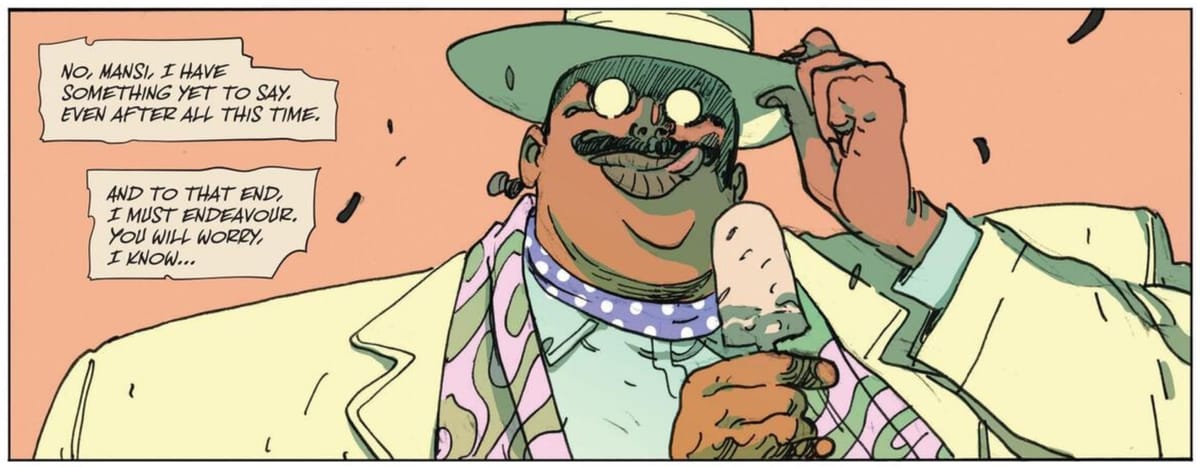
There are things that we forget. Whether you’re some ancient demon known for eating people (and maybe the chances are pretty good that this is you) or a 20-something wannabe filmmaker, life is long and hard. There are things we want to put behind us and forgetting them is the easiest way to accomplish that. Unfortunately, memory isn’t a precise instrument like a surgeon’s scalpel, aimed and directed. It’s more like a wrecking ball, tearing down everything in its path. That’s where Ram V and Filipe Andrade’s Rare Flavours begins and ends—with a demon and a young man trying to remember connections that were important to their lives.
This tale itself is a feast as we travel with the demon and the filmmaker. Andrade’s art tickles all of your senses even as it only interacts with one of them. There’s no sound, taste, smell, or touch involved but there aren’t many artists who can trick you into hearing all of the background noises or smelling the scents of a pot on the stove. Andrade sculpts these environments to be a sensory experience. This is a story that you don’t just read but you get to live in for a brief time. He’s drawing a story about travel and fool that leaves you hungry and with a wanderlust. Ram V can write about the preparation of a dish on a starry night but Andrade makes you think that you’re sitting next to the fire, taking in all the smells and sounds that the characters are. He needs to do this with different food and different settings; he needs to convince you that you’re in the kitchens, stilling at the food carts, and walking through the markets. This is largely a comic about those moments in life and what they mean so Andrade has the hefty job of taking you out of your comfort zone and spiritually moving you into other places and other lives.

Rubin Baksh, the large demon who has lived as a man for a long time, enlists the struggling filmmaker Moran to make a film about travel and food. The two begin a Quixotic-like journey across India to find meaning in a world that is missing it. Writing a letter to a woman that he left behind for this journey, Rubin tells her “[Anthony Bourdain] was my videotape window into this world. A man who had found a way to bind together its many disparities through the things he loved. And here I was with all eternity at my doorstep— a coward, brewing tourist coffee and selling overpriced pastries in fucking Somarah. No, Mansi, I have something yet to say. Even after all this time.” V and Andrade are working within that Bourdain spirit (the man who introduced his show about travel and food with the line “and I’m hungry for more…” of needing to rediscover a connection to this world that they once had. It’s this longing sense for a connection, a belonging, and some kind of unity that Rubin and Mo both recognize doesn’t exist in their broken worlds.
Mohan, a lanky, shaggy-haired young man, gets drawn into Rubin’s inescapable orbit. Well, there’s one way to escape it that we’ll get to in a moment. Rubin, usually hiding his eyes behind round-rimmed glasses, wants to go off and have this grand, romantic quest but it’s not enough to just have it. He feels the need to document it— a bit of hubris thinking he could fill the void left by Anthony Bourdain’s suicide. Bourdain had the adventures that Rubin wanted but in the end, Bourdain still felt like something was missing which drove him to his final decisions in this world. In hindsight, we should be able to see that Bourdain’s travels were about the search as much as they were about the destination but it was all too easy to get caught up in the exotic locals and cuisine. But inspired by Bourdain, Rubin recognizes that something is missing but is it in the world or him? In his old demonic days, Rubin was the demonic Bakasura, known for eating people. That’s a part of himself that he’s hidden for a long time but this journey brings it out of him again as he begins secretly eating people that they encounter along this journey. It’s another way of trying to satiate his hunger but he keeps his secret from Mohan and the story that they’re trying to create together.
Mo is a young man, who knows what he wants to do but has his own demons that get in his way. Not demons like what Rubin is but the kind of demons that we all have, those nagging doubts and feelings that stand between us and happiness, contentment, fulfillment, or meaning in our lives. He’s young and directionless, needing someone or something to show him a path forward. He’s pulled into Rubin’s story and it’s a question of whether his part of it is a coming-of-age or a horror story. Is he going to be the next one that Rubin eats? V and Andrade answer that one early for the audience if not the character. It’s not too much of a mystery for us but it is a question for Mohan even as he decides to continue with Rubin once he learns the truth about his companion.

And then there’s the two sinister men hunting down Rubin— Dilshan and Dilkush. They have a sense of purpose and direction that our “heroes” don’t have— a surety and righteousness in their mission. They even have relationships and a partnership that Rubin and Mohan lack but there’s a depth of being that’s missing from them. We see these two pairings and each of their contrasts to the other is practically the story itself. One pairing shows the quest that the other pairing is truly on— there are the obvious quests (i.e. the plot) but then there is the journey for meaning that drives the quest (i.e. the story, the characters, and their development.). It’s easy to see Dilshan and Dilkush as the bad guys, as the villains of the piece but V and Andrade come at them from a Hayao Miyazaki-like perspective where the antagonists aren’t always the villains.
In Miyazaki stories, there’s usually our hero and then the “bad guys” whose aims run counter to our protagonist’s. Throughout the story, we usually find out that just because their goals in perspective are different, that doesn’t make them evil or a villain. Their point-of-views are different and maybe even in conflict with the heroes but Miyazaki’s characters are more nuanced and complicated than just being able to call them “good guys” and “bad guys.” For instance, in Rare Flavours, our protagonist is an ancient demon who frequently eats people. That sounds kind of villainous and hardly a “good guy” but he’s one of the two characters we’re meant to empathize with.
Rubin begins his journey remembering Anthony Bourdain. Bourdain seemingly found a culinary home anywhere— eating in the fanciest of fancy restaurants or in someone’s home, a guest for the night but given a king’s feast. Through his writing and television shows, Bourdain taught us about more than food and travel. After watching one of his shows, do you know any more about how to get to Vietnam or how to make a gourmet masterpiece? Those were entry points into his storytelling but maybe that’s what Rubin focuses on a bit too much and what he thought drove the emptiness that he felt. But that was rarely the focus of Bourdain’s storytelling.
Rubin, Moran, Dilshan, and Dilkush are all trapped in their lives, in their wants, and even in their grief. While they can recognize the trap, they can’t quite overcome it. Ram V and Filipe Andrade tell this story in ways that fill all the senses as each of these characters looks to satiate their hunger. For life, for love, for revenge, for purpose, for someone to understand, this story is about people asking for compassion but also having to give it. And that’s what a relationship is— a connection between people that’s both giving and receiving. In the end, Rare Flavours is a fulfilling feast that pushes us to be a bit kinder and more patient with ourselves and others as we stumble our way through this world.
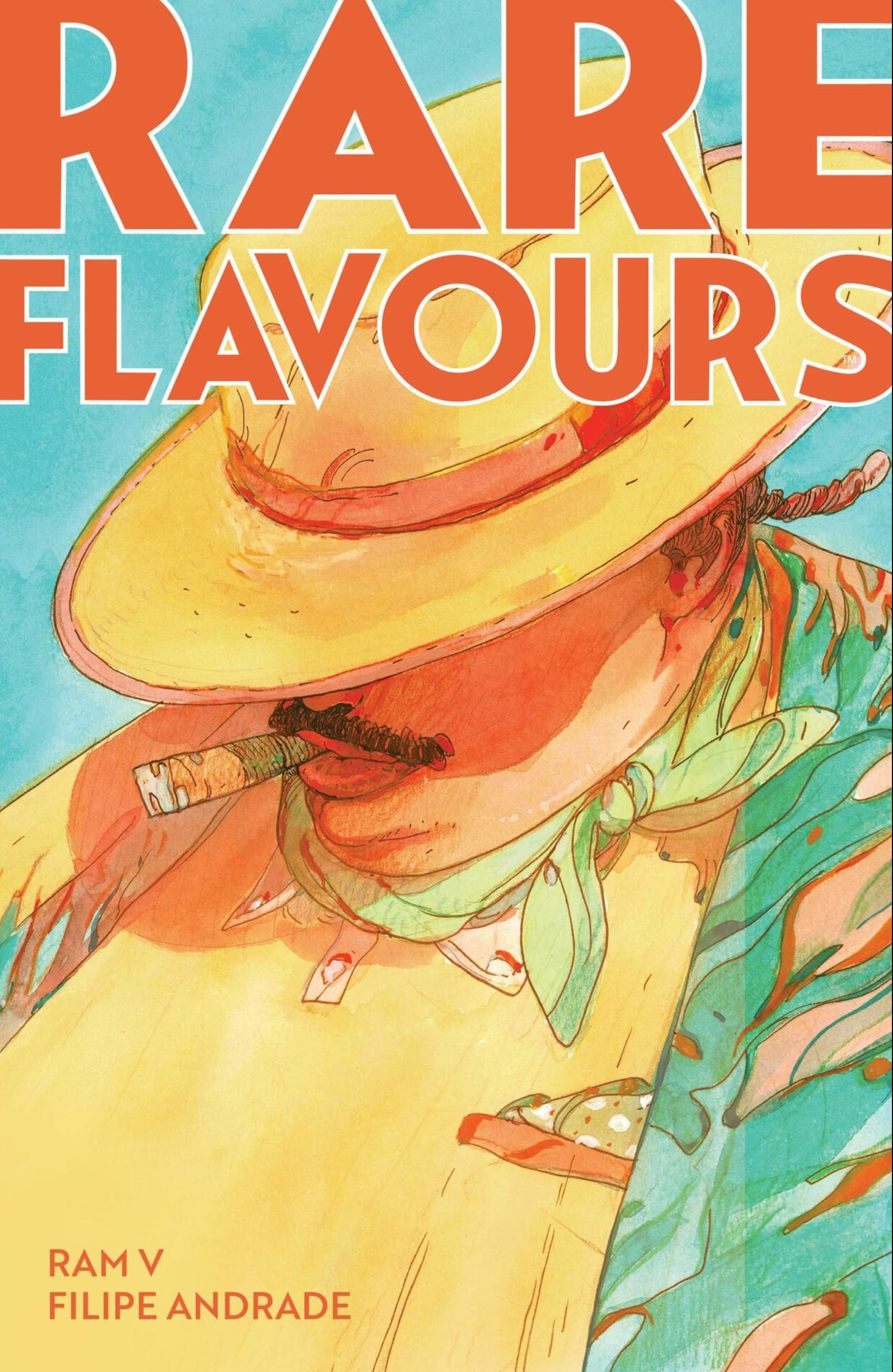


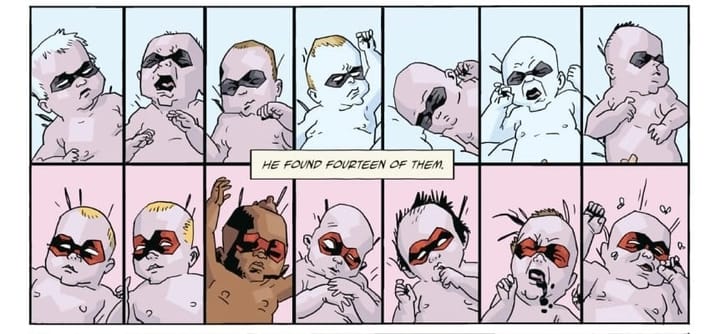
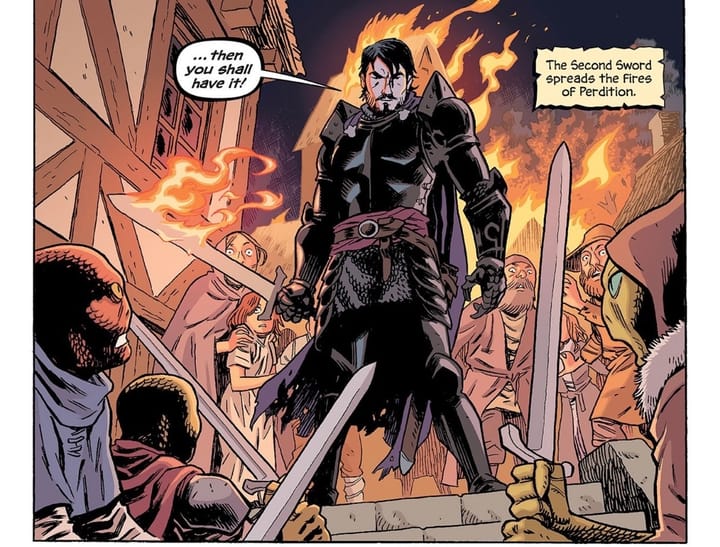
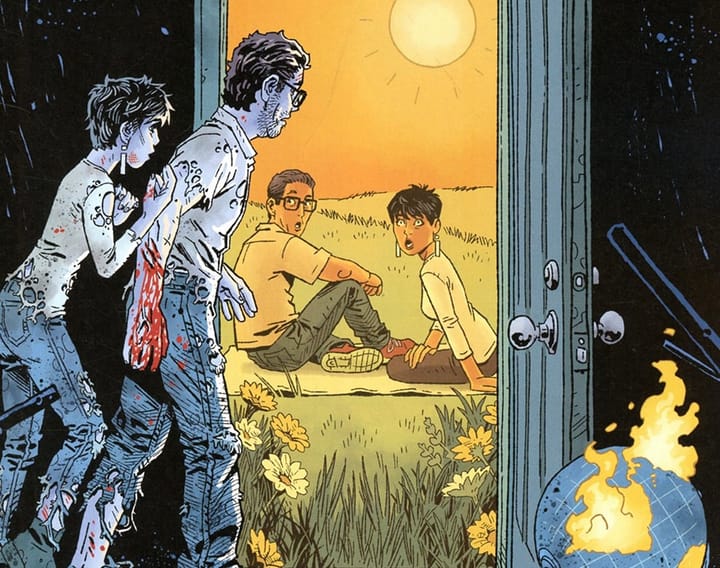
Comments ()